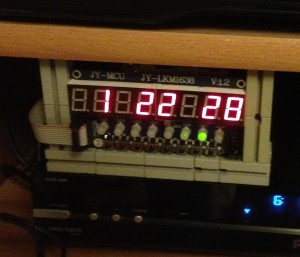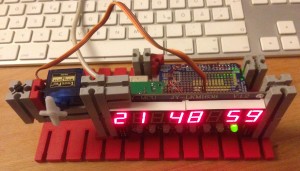How to build an easy arduino clock. Why building a clock, since one can buy all kind of clocks? Two causes, first for the fun of it and second I can build the functions as I like and how they work. I also plan to add more functions from time to time.I wrote easy, that means not doing too much on the hardwork side. One can get an 8 7-segment LED (TM1638 LED Display Modules) with electronics, so there are only 5 wires needed for the display (and there are added 8 buttons). 5 more wires for the real time clock and off we go.
Wiring is an easy job, it’s explained in the source code. I implemented only settings for hour and minute (changing minutes also resets seconds), as I think it’s easier to set the date once with the arduino IDE. But feel free to add the extra functions.
I plan to add functions for servos and others for alarm and count down timer.
Here are the links which will help you: TM1638, Library DS1302
And here is the code:
/*
Clock Program 2014
by Johannes Eiseler eiseler.synology.me/wordpress
given to public domain
shows time and date on a TM1638
use buttons for brightness, and setting hour and minute
// feel free for using it setting the date
// use the leds too
uses this libraries:
#include <TM1638.h>
#include <DS1302.h>
#include "Timer.h" // Use a timer
*/
#include <TM1638.h>
#include <DS1302.h>
#include "Timer.h" // To do it with a timer
// define a module on data pin 8, clock pin 9 and strobe pin 7
// am stecker: rot ist plus; dann in der reihenfolge: Vcc, Gnd, CLK, DIO, STB0
//TM1638 module(8, 9, 7); // data, clk, strobe
TM1638 module(8, 7, 9); // data, clk, strobe -> this is easer for wiring
// Init the DS1302
DS1302 rtc(2, 3, 4);
// DS1302: CE pin -> Arduino Digital 2 RST
// I/O pin -> Arduino Digital 3 DAT
// SCLK pin -> Arduino Digital 4 CLK
// VCC, GND, CLK, DAT, RST
Time time;
unsigned long timenumber;
String mystring = String(8);
int ss, ss1, dir;
int hh, mm;
byte bright = 3;
Timer timer;
byte mybyte;
// Status 0=zeit anzeigen
// --- erstmal nichteinstellen 1=Jahr, 2=Mon, 3=Tag, 4=DayOfWeek, 5=hh, 6=min,
// einstellen 1=HH, 2=Min, 3=Sec
int status = 0;
//Servos
void setup() {
// Serial.begin(9600);
// Set the clock to run-mode, and disable the write protection
rtc.halt(false);
rtc.writeProtect(false);
//#################################
// The following lines can be commented out to use the values already stored in the DS1302
// but comment in the first run
/*
rtc.setDOW(THURSDAY); // Set Day-of-Week to ....
rtc.setTime(14, 40, 0); // Set the time to 12:00:00 (24hr format)
rtc.setDate(25, 8, 2016); // Set the date to August 8th, 2016
*/
//#################################
// display a hexadecimal number and set the left 4 dots
module.setDisplayToHexNumber(0x1234ABCD, 0xF0); //Test
module.setupDisplay(true, 1);
//Serial.begin(9600);
timenumber = 123456;
//Serial.begin(9600); // zum debuggen
mybyte = 1;
// Uhrzeit im RTC-Chip setzen nur einmal
//RTC.setTime(&time);
ss= 0;
ss1=0;
dir = 0; // Lauflicht Richtung
timer.every(125, doTick);
}
void loop() {
timer.update();
byte keys = module.getButtons();
switch(keys){
case 0b0000001: //leftmost button
bright++;
if (bright >8) bright = 0;
module.setupDisplay(true, bright);
//module.setLEDs(0b10101010 & 0x00FF);
module.setLEDs(bright & 0x00FF);
delay(500);
break;
case 0b0000010: //leftmost + 1button Start setting
status ++;
if (status == 3) status = 0;
delay(500);
break;
case 0b0000100: //leftmost + 2button plus hh oder min
if (status == 1) {
hh++;
if (hh >= 24) hh = 0;
rtc.setTime(hh, mm, 0);
}
if (status == 2) {
mm++;
if (mm >= 60) mm = 0;
rtc.setTime(hh, mm, 0);
}
delay(250);
break;
case 0b0001000: //leftmost + 3button minus hh oder min
if (status == 1) {
hh--;
if (hh < 0) hh = 23;
rtc.setTime(hh, mm, 0);
}
if (status == 2) {
mm--;
if (mm < 0) mm = 59;
rtc.setTime(hh, mm, 0);
}
delay(250);
break;
}
delay(10);
}
void doTick(){
// light the first 4 red LEDs and the last 4 green LEDs as the buttons are pressed
// module.setLEDs(((keys & 0xF0) << 8) | (keys & 0xF));
// hin und her lauflicht
if (status < 1) {
if (dir == 0) mybyte = mybyte << 1;
else mybyte = mybyte >> 1;
module.setLEDs(mybyte & 0x00FF);
if (mybyte == 1) dir =0;
if (mybyte ==128) dir = 1;
}
else {
//module.setLEDs(0b11111111 & 0xFF00);
module.setLEDs(0xFF00); //alle rot
//module.setLEDs(0x00FF); //alle grün
}
// ende lauflicht
//RTC.getTime(&time);
time = rtc.getTime();
//Serial.println(time.sec);
// my rtc seems to be buggy, so next lines to clean
if (time.sec == 0 && time.min == 0 && time.hour == 0) { delay(10); time = rtc.getTime(); };
if (time.sec == 0 && time.min == 0 && time.hour == 0) { delay(10); time = rtc.getTime(); };
if (time.sec == 0 && time.min == 0 && time.hour == 0) { delay(10); time = rtc.getTime(); };
if (time.sec == 0 && time.min == 0 && time.hour == 0) return;
//ss1 = time.getSecond();
ss1 = time.sec;
if (status < 1) {
if (ss1 != ss){ //do nothing if the seconds didn't change since last display
word decpoints = 0b00000000;
if ((ss1 >= 20 && ss1 < 24) || (ss1 >= 40 && ss1 < 44)){
mystring ="";
int dd = time.date;
if (dd < 10) mystring = mystring +" ";
mystring = mystring + String(dd);
int mo = time.mon;
if (mo < 10) mystring = mystring +"0";
mystring = mystring + String(mo);
int yy = time.year;
mystring = mystring + String(yy);
decpoints = 0b01010000;
//if (ss1 < 26) servo1.write(45);
//if (ss1 > 39) servo1.write(135);
}
else {
ss = ss1;
//timenumber = time.getHour() * 1000;
timenumber = time.hour * 1000;
mystring = "";
hh = time.hour;
if (hh < 10) mystring = mystring +" ";
mystring = mystring + String(hh);
mystring = mystring +" ";
mm = time.min;
if (mm < 10) mystring = mystring +"0";
mystring = mystring + String(mm);
mystring = mystring +" ";
//ss = time.getSecond();
if (ss < 10) mystring = mystring +"0";
mystring = mystring + String(ss);
}
module.setDisplayToString(mystring,decpoints);
}
}
else //button to set the time
{
hh = time.hour;
mm = time.min;
switch(status) {
case 1:
mystring = "Hour" + String(hh) + " ";
module.setDisplayToString(mystring,0);
break;
case 2:
mystring = "Min " + String(mm) + " ";
module.setDisplayToString(mystring,0);
break;
}
}
}


